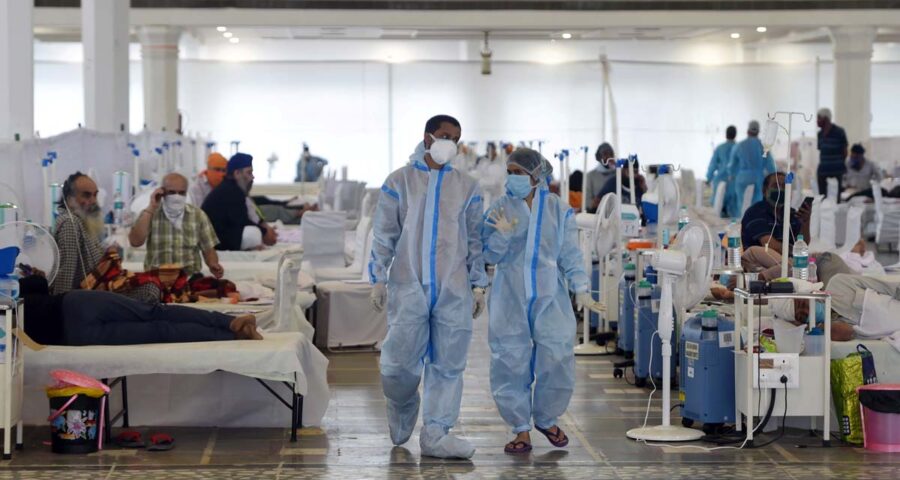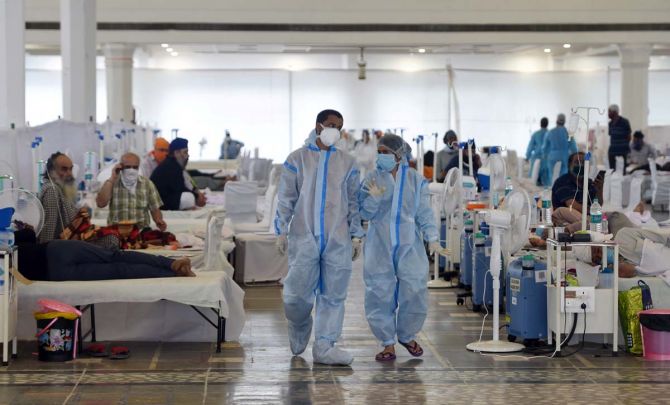While states like Tamil Nadu say they would run a parallel digital health programme with unique user IDs, others feel running a parallel scheme may create confusion.
As India gears up to roll out Ayushman Bharat Digital Mission (ABDM) across the country, states are not on the same page.
While states like Tamil Nadu say they would run a parallel digital health programme with unique user IDs, others feel running a parallel scheme may create confusion.
States like Tamil Nadu aim to take a distinct approach to implementing the ABDM. It plans to link the unique health identification (UHID) with the National Digital Health Mission (NDHM), but none of the vital data of a patient’s health will be shared with the Centre.
The state has already invited expressions of interest for technological support from industrial players for which almost 10 players, including Tech Mahindra, Zoho Corporation and Armaan, have shown interest, said sources. The target by the state is to create 66 million UHIDs.
When contacted, state health secretary J Radhakrishnan told Business Standard that the idea is to integrate all the state health programmes into one health ID. But this will be done without divulging whether it would be integrated with the NDHM.
“Only necessary indicators of these will be linked with the ABDM, while all the data will be with the individual. It will be used as a proxy ID for all the 134 state health schemes,” said another state official. The state has also lined up a differential privacy policy, based on which three entities – citizen, health practitioners and the government — will have separate privacy parameters.
When it comes to implementing central schemes, the track record is not uniform — West Bengal, for example, is yet to even implement the Ayushman Bharat health insurance scheme.
Chhattisgarh, on the other hand, is not keen on having a dual system. The state’s health secretary Alok Shukla said there is no point in having multiple identifications. “There is no requirement for a separate health ID as we already have Aadhaar as a unique ID. Everything can be linked to that,” he said.
States like Gujarat say it has already integrated its state health insurance scheme with the Prime Minister Jan Arogya Yojna (PMJAY). Now, it can leverage this database of 6.5 million families and take their consent to on-board them on ABDM.
Speaking to Business Standard, Jaiprakash Shivhare, health commissioner of Gujarat, said it will follow the central guidelines for digital health mission and create unique IDs for that.
“We already have a database of 6.5 million families, who are a part of the health insurance schemes like PMJAY and state health insurance schemes. We can proceed by seeking consent from these individuals, following data privacy-related guidelines,” he said.
Additional chief secretary of Maharashtra Pradeep Vyas confirmed that there was no plan to have any parallel digital health ID or programme in the state. The ABDM implementation is expected to have teething troubles.
Public health experts are not very confident about the pilot that was run in six union territories as a benchmark for a national roll out. The pilot was launched in August 2020 in Chandigarh, Ladakh, Dadra and Nagar Haveli and Daman and Diu, Puducherry, Andaman and Nicobar Islands and Lakshadweep.
“The piloting may not necessarily show all the glitches because they have been done in relatively sterile conditions where the central government has direct control over the administration. When this gets rolled out in larger states, we do not know how well the system will function and the quality of data that will emerge,” said K Srinath Reddy, president, Public Health Foundation of India.
Source: Read Full Article


